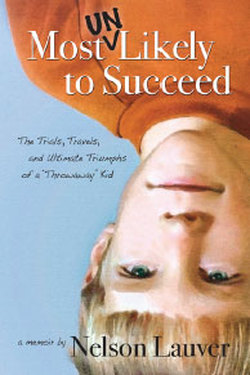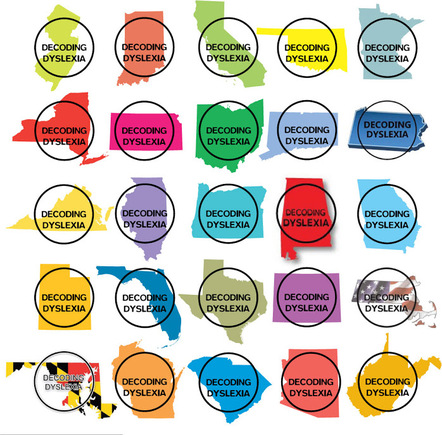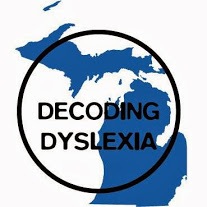
Some people do not believe in labeling children with a learning disability or dyslexia. They feel that labeling puts limitations on their potential for achievement. I can see this point to a degree, but while I think labeling has the potential to limit ones' expectations, I feel more strongly that NOT labeling has the capacity to limit one's potential even more.
Take the memoir of Nelson Lauver for instance, which is resonating with thousands and thousands of people all over the world because it rings true to their own stories. Nelson grew up in an era when the label Learning Disabilites (LD) was not well known or used. He started out life as a happy, intelligent, rambunctious little boy. When he started school, life began to take a wrong turn. Without a label for his struggles, he was viewed as stupid by his teacher and classmates. Without knowledge of LD's, dyslexia, etc., his education created a 'monster'---he was so intelligent, that he learned how to act, how to manipulate situations and outcomes, he even manipulated the testing by professionals. He chose his own path, and at the age of 6-8 years old, he chose that path with the maturity and breadth of knowledge of merely a child. He chose the 'bad kid' path so that he wouldn't be called on in class to read or write in front of his peers, so his peers didn't ask him for help with reading and writing but most importantly, to preserve his own self-esteem; its easier to choose to be viewed a certain way than it is to be 'labeled' erroneously by your peers. The intelligence & insight that it takes for a child to instinctively chose self-preservation leaves me awe-struck. The path that he chose, allowed him to bumble thru his academic life, to eek out a meager education and graduate. It also allowed him to surface from the depths of the dungeon that trapped him for 12 years to begin to tread water as a young man, earning a living by creating his own destiny. Society is damned lucky he didn't falter--his life could have had a totally different outcome.
By not putting a label on kids, society often adds its own labels instead, most of the time these are WRONG labels. Without proper diagnosing of an issue, we miss some very important steps. By having an avenue in which to meander, we can recognize some of the most odd characteristics of dyslexia in young children that are so common among our kids when we look at them collectively. If I had known these characteristics (like calling familiar objects/people by the wrong name; being unable to tie shoes; etc.) when my son was in preschool--I would have been able to begin a targeted intervention instead of floundering around, wondering if it was this or that. When he could not identify many letters of the alphabet, but was beginning to read stories, I would not have been so relieved that the process appeared to be beginning.....I would have recognized sooner that he was using his awesome memory skills to memorize the stories he'd read in small group at school to read to me at home. I was questioning his memory instead because it appeared that while he could read larger words on a page, he would miss the simplest ones like 'the, and, is'; what he was really doing was using his intelligencce to figure out the larger words using the context clues.
Analyzing errors can be tricky when you don't know what you're looking for, labeling allows us to lump characteristics together (the odd ones and the main ones), giving us possible approaches that lead to help! Recently, I sat in a meeting where the evaluator was shocked at the responses the child had given on a word reading task, she reported that the child was so close in her responses that she felt the child just wasn't paying attention to the details, therefore, it was clear to her that AD/HD may be an issue. I was sad, angry and filled with anxiety because I was analyzing the errors--writing down the words the child should have read and on top of each, the response that the child had given--quite clearly a pattern was developing. With the knowledge of dyslexia that I have, I was able to disway the laser focus of AD/HD discussion to one of a decoding issue. The parent said that while the school had been advising her of attentional issues for the past few years, she had held off because while she saw the attention issues they weren't consistent. She also shared that the child's doctor had prescribed medication but was 'on the fence' about it--they were in a trial period. Within a short time of informal testing, working with the child and observing her learning patterns, I was confident in recommending that the mom consider researching dyslexia. She was so relieved --it made sense because of the struggles her child faced daily in school but were so different than her behavior and performance at home or in situations that weren't academically related. Additionally, she was relieved that this may lead to some targeted solutions. It is wonderful to feel like you made a difference in that person's life, but also disheartening at the same time---it's only one--why isn't this knowledge more common? Why isn't this knowledge sprayed out like a firehose instead of a trickle of water in an abandoned warehouse?
Decoding Dyslexia organizations around the country (and now beginning to reach its arms around the world!!) are working hard to raise the awareness of dyslexia. Celebrities and important business leaders and entrepreneurs are doing their part too which is making great impacts in ways that a group of parents simply cannot reach alone. People like Nelson Lauver are brave enough to tell their stories and are such good writers that their stories leave us laughing, crying and most importantly, connecting. Please read this humorous, touching and eye-opening book, Most Unlikely to Succeed; The Trials, Travels and Ultimate Triumphs of a 'Throw-Away Kid', you will be glad you did and if you haven't yet volunteered to take some action with your local chapter of Decoding Dyslexia, maybe this will inspire you to do so, we're looking forward to your help!
Nelson Lauver--Motivational Speaker, Voice-Over Artist; Literacy Advocate; The American StoryTeller
Take the memoir of Nelson Lauver for instance, which is resonating with thousands and thousands of people all over the world because it rings true to their own stories. Nelson grew up in an era when the label Learning Disabilites (LD) was not well known or used. He started out life as a happy, intelligent, rambunctious little boy. When he started school, life began to take a wrong turn. Without a label for his struggles, he was viewed as stupid by his teacher and classmates. Without knowledge of LD's, dyslexia, etc., his education created a 'monster'---he was so intelligent, that he learned how to act, how to manipulate situations and outcomes, he even manipulated the testing by professionals. He chose his own path, and at the age of 6-8 years old, he chose that path with the maturity and breadth of knowledge of merely a child. He chose the 'bad kid' path so that he wouldn't be called on in class to read or write in front of his peers, so his peers didn't ask him for help with reading and writing but most importantly, to preserve his own self-esteem; its easier to choose to be viewed a certain way than it is to be 'labeled' erroneously by your peers. The intelligence & insight that it takes for a child to instinctively chose self-preservation leaves me awe-struck. The path that he chose, allowed him to bumble thru his academic life, to eek out a meager education and graduate. It also allowed him to surface from the depths of the dungeon that trapped him for 12 years to begin to tread water as a young man, earning a living by creating his own destiny. Society is damned lucky he didn't falter--his life could have had a totally different outcome.
By not putting a label on kids, society often adds its own labels instead, most of the time these are WRONG labels. Without proper diagnosing of an issue, we miss some very important steps. By having an avenue in which to meander, we can recognize some of the most odd characteristics of dyslexia in young children that are so common among our kids when we look at them collectively. If I had known these characteristics (like calling familiar objects/people by the wrong name; being unable to tie shoes; etc.) when my son was in preschool--I would have been able to begin a targeted intervention instead of floundering around, wondering if it was this or that. When he could not identify many letters of the alphabet, but was beginning to read stories, I would not have been so relieved that the process appeared to be beginning.....I would have recognized sooner that he was using his awesome memory skills to memorize the stories he'd read in small group at school to read to me at home. I was questioning his memory instead because it appeared that while he could read larger words on a page, he would miss the simplest ones like 'the, and, is'; what he was really doing was using his intelligencce to figure out the larger words using the context clues.
Analyzing errors can be tricky when you don't know what you're looking for, labeling allows us to lump characteristics together (the odd ones and the main ones), giving us possible approaches that lead to help! Recently, I sat in a meeting where the evaluator was shocked at the responses the child had given on a word reading task, she reported that the child was so close in her responses that she felt the child just wasn't paying attention to the details, therefore, it was clear to her that AD/HD may be an issue. I was sad, angry and filled with anxiety because I was analyzing the errors--writing down the words the child should have read and on top of each, the response that the child had given--quite clearly a pattern was developing. With the knowledge of dyslexia that I have, I was able to disway the laser focus of AD/HD discussion to one of a decoding issue. The parent said that while the school had been advising her of attentional issues for the past few years, she had held off because while she saw the attention issues they weren't consistent. She also shared that the child's doctor had prescribed medication but was 'on the fence' about it--they were in a trial period. Within a short time of informal testing, working with the child and observing her learning patterns, I was confident in recommending that the mom consider researching dyslexia. She was so relieved --it made sense because of the struggles her child faced daily in school but were so different than her behavior and performance at home or in situations that weren't academically related. Additionally, she was relieved that this may lead to some targeted solutions. It is wonderful to feel like you made a difference in that person's life, but also disheartening at the same time---it's only one--why isn't this knowledge more common? Why isn't this knowledge sprayed out like a firehose instead of a trickle of water in an abandoned warehouse?
Decoding Dyslexia organizations around the country (and now beginning to reach its arms around the world!!) are working hard to raise the awareness of dyslexia. Celebrities and important business leaders and entrepreneurs are doing their part too which is making great impacts in ways that a group of parents simply cannot reach alone. People like Nelson Lauver are brave enough to tell their stories and are such good writers that their stories leave us laughing, crying and most importantly, connecting. Please read this humorous, touching and eye-opening book, Most Unlikely to Succeed; The Trials, Travels and Ultimate Triumphs of a 'Throw-Away Kid', you will be glad you did and if you haven't yet volunteered to take some action with your local chapter of Decoding Dyslexia, maybe this will inspire you to do so, we're looking forward to your help!
Nelson Lauver--Motivational Speaker, Voice-Over Artist; Literacy Advocate; The American StoryTeller



 RSS Feed
RSS Feed
